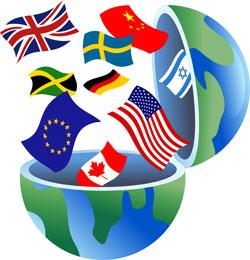Choosing and declaring a major is always an important step. It is a relatively easy decision when you have
already decided what you would like to do in the future. However, entering the college without a particular
major in your head, like I did, is a way more complicated. Taking a great diversity of general courses has
definitely broadened my knowledge, and specified my interests in the given fields. However, one of the
lessons I carried from the late declaration of major is the lesson of the waste of time. When carefully revised,
there is a set of courses that can double count towards both: major requirements and general requirements.
It is essential to keep this in mind as time passes incredibly fast while you are in college, and it is better to
fulfill most of the requirements before you reach senior year.
Currently, I am a second semester junior with the major in Political Science and minor in Organizational
Science. Am I going to be a president? Probably not. However, I would like to make a change, and make an
impact on the society I am growing up in. I believe that possessing a wide range of knowledge in the political
science can help fixing the weaknesses of the government, society, and the mechanisms that come into play
in the controversial world of politics.
Did I choose the right major?
It is a good question everyone is asking themselves. My response: I don’t know. I chose what interested
me the most, what is concerning. Of course, as most of the students I had strong family’s influence when
making a decision. However, it is hard to say what is right and what is wrong. In every field of study one
can find an area where he/she belongs to.
Why do I love it? It introduces me to the world!
I love it because I can educate people around me, and because the knowledge I am currently getting prevents
me from making thoughtless conclusion of the recent events and political situations. The more involved I get
into the politics of the countries of different regions, the more I understand to what extent the politics
worldwide are intertwined. There are models from South East Asia practiced in late 14th century that can help
explaining current situation in some other region. In the same way, studying Indonesia as the country with the
largest Muslim population in the world without studying the Middle East where Islam takes its origins, and the
South East Asia’s historical development that explains the formation of Indonesia, is like trying to grow the
tree on the stones. One will never fully understand the concept without going deeper into the soil and the
conditions this concept was coming from.
I will be more specific and talk a little bit about the political science professors, and courses in the George
Washington University. I will not mention their names to preserve the confidentiality. Most of the professors
I had so far were exceptional specialists in the field or region of study they were introducing to the class. All of
them were able to move "off track" and involve into discussion of the certain concepts that are related to
the topic but not required for the course. Political science courses in GWU are focused on the development of
the analytic skills that provides the students an opportunity to think “out of box” by carefully analyzing the
examples from all over the world. The structure of the courses give students a chance to explore issues within
their fields of interest with the help of the wide range of the material provided or recommended by the instructors.
“What region are you studying?”
Most of my friends with the political science major choose a region, and take courses only touching on the
issues concerning those regions. However, while being interested in the Middle East, Latin America, and Russia,
I am taking courses that focus on the comparative politics within different regions all over the world. I believe
that one cannot fully understand the complicated world of politics with all its models and strategies without
analyzing cases from various regions, and times in the history.
“What will you do after graduation?”
This is a kind of question you will be asked every time you meet new people. Honestly, I have not decided yet.
I want to travel and explore the world. I want to learn and be educated every day. I have a personal respect to
people who have already decided their future career path. However, how can one decide on their future when
being overwhelmed with the college life. There is a whole world of opportunities, and everyone needs time to
explore them personally. I am looking towards graduation next year. I will travel. I will look for
the opportunities that make my perspective and worldview rich and worth considering.
We are all growing up in the consumer society. We spend money to get education and then looking for a
high paid job to pay for the education we get to get that job. I do not need money and luxury, I need “rich”life
that will help me understand the complicated world of politics and the relations between the society and the
state. One of my main goals is to build a “political map” with a strong understanding of interdependence of all
of the regions in the world with their strengths and weaknesses.
Advice to the students with Political Science major (and not only)
Do not stick to political science only. Be involved and participate in various organizations and events.
Educate yourself. Remember that there is almost nothing that cannot contribute towards your understanding
of the political science: participate in the speeches and the debates that touch on issues that concern the society
these days, join the human right advocacy organization, or help conducting psychological research. Everything
will appear to be useful in the end.
Overall, political science as a major is not only a set of knowledge that will give you the understanding of
basic concepts and tools that are used in the modern politics. It is a major that gives you a diverse variety of
paths to explore.






